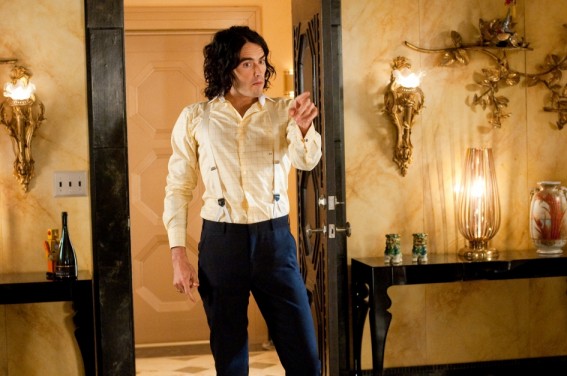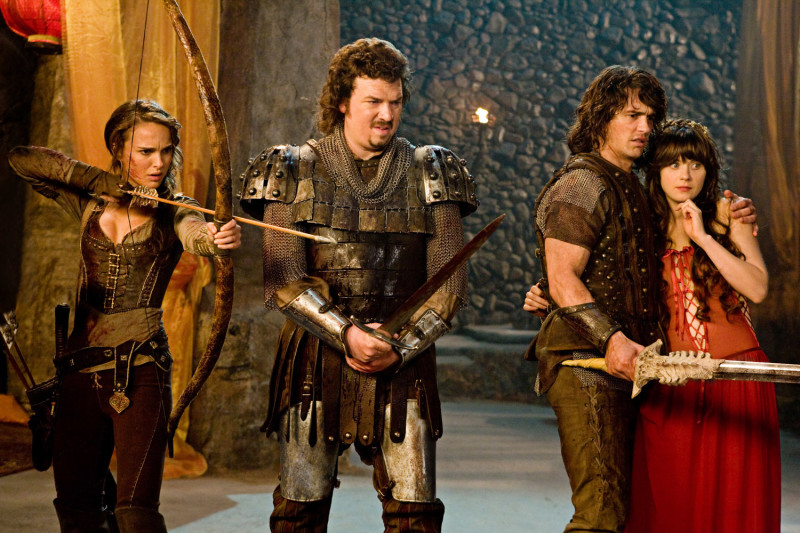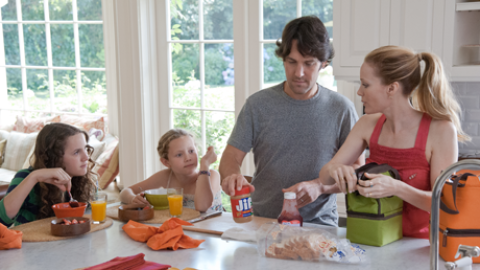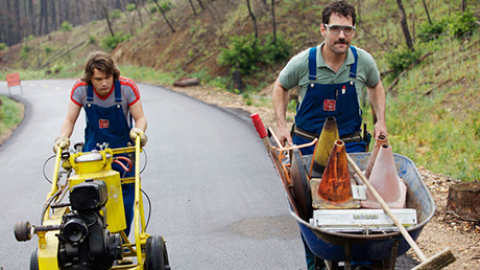Foundas on Film: Arthur, Your Highness

The best thing to come of the painfully unfunny and wholly unnecessary remake of Arthur is that it may encourage some moviegoers to revisit—or discover—the Oscar-winning 1981 original, just to see what the fuss was about. The first (and only) feature directed by a promising young writer-director named Steve Gordon, who died the following year of a heart attack at age 44, the first Arthur was hardly a masterpiece, but it was a highly enjoyable comedy of manners done in a style that, even at the time, seemed quaintly old-fashioned. It was clear from the pithy dialogue and the panorama of slightly exaggerated farcical supporting characters that Gordon had been weaned on the likes of Coward, Shaw, and Wilde, and the sophisticated Hollywood comedies of the Thirties and Forties. At its best, the movie suggested the sort of picture that Ernst Lubitsch might have been making in the Eighties, and it featured a performance by John Gielgud, as the lifelong butler to the spoiled man-child Arthur (played by Dudley Moore), that approached the sublime.
This new Arthur is a sorrier state of affairs (sorrier, even, than 1988’s official sequel, Arthur 2: On the Rocks), in which it is frequently difficult to determine whether the filmmakers have greater contempt for the audience or for their own characters. The basic story remains the same, which only goes to show how many thousands of nuanced decisions made by writers, directors, producers, and actors between the page and the screen can forever alter the course of a perfectly good piece of material. Fatally overindulged and under-disciplined, thirtysomething Arthur Bach (now played by Russell Brand) spends his days sleeping off his debauched, drunken nights—antics that regularly land him in the tabloids and strike fear in the hearts of the investors in his family’s well-endowed foundation (to which Arthur is the sole heir). Arthur’s chilly CEO mum wants him to settle down and marry Susan (Jennifer Garner), an ambitious careerist inside the family company, because it will be a smart business transaction, something to set the investors’ nerves at ease. But Arthur has his eyes set on Naomi (Greta Gerwig), an exotic free spirit from the wrong side of the tracks (i.e., Brooklyn) who cute-meets her way into his life and makes him feel something like true love for the first time in his life.
Getting an audience to feel sympathy for an obscenely rich character who flaunts his wealth obscenely is no mean feat, but the original Arthur managed to pull it off due in large part to the ingenious playing of Moore, whose Arthur really did seem like an impetuous toddler in top hat and tails, still splashing about in bubble baths and playing with children’s toys. It was, above all, a brilliant physical performance in which Moore used his own diminutive stature to suggest both arrested development and also a small man’s atomized self-loathing, his unhappiness inside his own body and his sense that nobody could ever desire him for any reason other than his deep pockets. (“But do you like me?” he asked tenderly, tragically of a blowzy hooker in one of the film’s early scenes.)
Brand, who sports the tall, tanned, airbrushed physique of an underwear model—and the same cocksure swagger—can’t hope to reproduce what Moore did physically with the role, but he’s all wrong for it in other ways, too. Brand’s whole public persona is that of a fun-loving party boy whose life is one long bacchanal, and this has been fed back into the Arthur character, who here presides over all-night revels in his Central Park penthouse and wakes up in the company of beautiful women who he has most definitely not paid to have sex with him. So the character comes across as altogether more of a brash, narcissistic brat, not so different from the dozens of spoiled heirs and heiresses who populate the personality pages and star in their own reality television series. And like Paris Hilton, a little of Brand goes a very long way.
American movies have always had a tough time depicting class honestly, and both versions of Arthur are built upon that creaky fantasy that says money can buy everything but happiness and that the poor are somehow more noble and virtuous than the rich because their nobility and virtue are all they’ve got. But it’s a cliché the original movie both acknowledged and deftly subverted at every turn, while the new Arthur keeps shoveling it at us with a vengeance. In a wonderful scene from the 1981 film, when Arthur shows up at the apartment of his working-class true love (Liza Minnelli, whose character was called Linda) to tell her he has to marry Susan or else he’ll be disinherited, and proceeds to offer her a generous payment for her troubles, we see Linda’s working-class father eavesdropping on the other side of the door, hoping against hope that she’ll take the money. Moreover, you know that Linda—an aspiring actress barely making ends meet as a waitress—wants to take the money, badly needs the money, even as she feigns righteous indignation and tears the check up in Arthur’s face. And at the end of the movie, when a now-penniless Arthur has left Susan at the altar to be with Linda, his eccentric grandmother offers him his inheritance back not because she feels sorry for him, but rather because she can’t stomach the idea of a Bach living in poverty—what ever would the neighbors think?
The 2011 Arthur doesn’t have a lick of that kind of honesty in its portrayal of the moneyed and starving classes. This time, when Arthur tells Naomi he’s marrying Susan and makes her the same financial offer, we don’t see her father lurking on the other side of the door, and her righteous indignation is meant to seem genuine. Indeed, this Naomi is the kind of fantasy working-class person frequently dreamed up by Hollywood screenwriters who don’t seem to have ever traveled south of Sunset or East of the 405. Instead of holding down a normal, boring, unsexy job like waiting tables, she’s a quirky, wind-in-her-hair bohemian, who wants to write children’s books and seems to subsist from giving unlicensed tours of Grand Central Station to Big Apple tourists. Periodically, she’s chased from the premises by the police, but it’s all in good fun, because, well, this is the sort of thing hungry blue-collar girls do to get by in the big city. And I haven’t even mentioned Naomi’s shabby-chic Brooklyn apartment, complete with elevated train romantically rocketing past the kitchen window. She doesn’t seem to need money to survive; she gets by on her own good vibrations.
Most of the other new ideas that director Jason Winer and screenwriter Peter Baynham bring to the table similarly smack of their mutual background in television sitcoms. The Susan character, who was originally just a spoiled rich girl herself trying to do her parents’ bidding, has here been transformed into a ball-busting yet sexually aggressive shrew far easier for the audience to despise (and far more humiliating for the actress, Garner, who has to play her). Even Hobson, the servant acted with such self-amused imperiousness by Gielgud in the 1981 film, has been turned into something more ordinary here: an acerbic nanny played well, but far more predictably, by Helen Mirren. Whereas Gielgud [cut] was doing low comedy for one of the first times in his formidable career, and doing it as if he were still doing Shakespeare, Mirren doesn’t show us anything here we haven’t seen before. But no betrayal leveled by this Arthur is as unforgivable as the PC decision that determines that a third-act visit to AA is in order. You can just imagine the conversations that must have taken place among the studio executives about the potential blowback to putting a “funny drunk” on the screen nowadays without giving him his comeuppance. And if there’s anything worse than a watered-down, big-screen sitcom, it’s a watered-down, big-screen sitcom that gets all socially responsible on us at the end. What ever can be next? A Thin Man reboot with a dry Nick and Nora Charles?
Relievedly, the medieval stoner comedy Your Highness shows absolutely no compunction about celebrating the hedonistic pleasures of imbibed substances. A reunion project of sorts for some of the merry pranksters responsible for 2008’s Pineapple Express—director David Gordon Green and stars James Franco and Danny McBride (who also co-wrote the script)—this unapologetically sophomoric romp is so crass it makes Cheech & Chong seem highbrow. (Hell, it makes Cheech & Chong look like Hecht & MacArthur.) Early and often come the dick jokes, the vagina jokes, the bodily-fluid jokes, and the gay-panic jokes. Some of which, I confess, are extremely funny.

Your Highness feels like a movie whose key creative participants were high when they thought of it, and possibly when they made it, and that amiable, light-headed goofiness carries it along. There are things here that could only have been conceived in an altered state, like the pederast Yoda who offers our intrepid heroes valuable advice in exchange for a hand job, or the very horny, very anatomically correct minotaur who takes a strong liking to the McBride character’s fey manservant. And where Pineapple Express began in a similarly enjoyable vein only to run out of comic energy and run aground with several episodes of brutally unpleasant violence, Your Highness never sacrifices its cheerful, one-thing-after-another absurdity, or its inability to take itself even remotely seriously.
Franco and McBride make a game pair as princely brothers Fabious and Thadeous, the one handsome and chivalrous, the other a pot-smoking slacker. When Fabious’s bride-to-be, the ditzy rescued damsel Belladonna (Zooey Deschanel), is kidnapped by the evil warlock Leezar (a hilariously sniveling Justin Theroux), who needs Belladonna’s womb to fulfill an ancient prophecy, Fabious sets off in hot pursuit, with Thadeous reluctantly tagging along. Along the way, they cross paths with a highly capable warrior princess (Natalie Portman, effectively serving as the straight man in this equation) who also seeks Leezar’s head on a plate, and a wild variety of strange, mixed-up creatures, among which I took particular pleasure in the shrieking ruler of a tribe of savages, who looks like a giant malformed baby and whose hand transforms into a venomous, hydra-headed serpent upon being inserted into a magic cauldron. Think of it as Big Trouble in the Middle Ages.
“Back when one first saw George Washington in 2000, did we think that, basically a decade later, David Gordon Green would be making movies like this? Do we think that he thought so? And if not, how did it happen?” So demanded a critic friend of me by email a few days after the Your Highness press screening. But as one who was never fully convinced by the strained poetry of Green’s early, pseudo–Terrence Malick phase, I’m not quite so alarmed by this recent turn of events. Indeed, there’s an exuberance to the filmmaking in Your Highness and Pineapple Express that I vastly prefer to the artificial languor of Green’s indie films. (I recall sitting in a theater watching Green’s All the Real Girls and wondering if the actors were moving so slowly across the screen because he had directed them that way or because they were prematurely arthritic.) There’s a genuine sense of humor here, too, dirty as it may be, which is the first indication that Green might have the chops after all for his long-stated dream project: an adaptation of John Kennedy Toole’s A Confederacy of Dunces. (With Danny McBride as Ignatius J. Reilly?)





